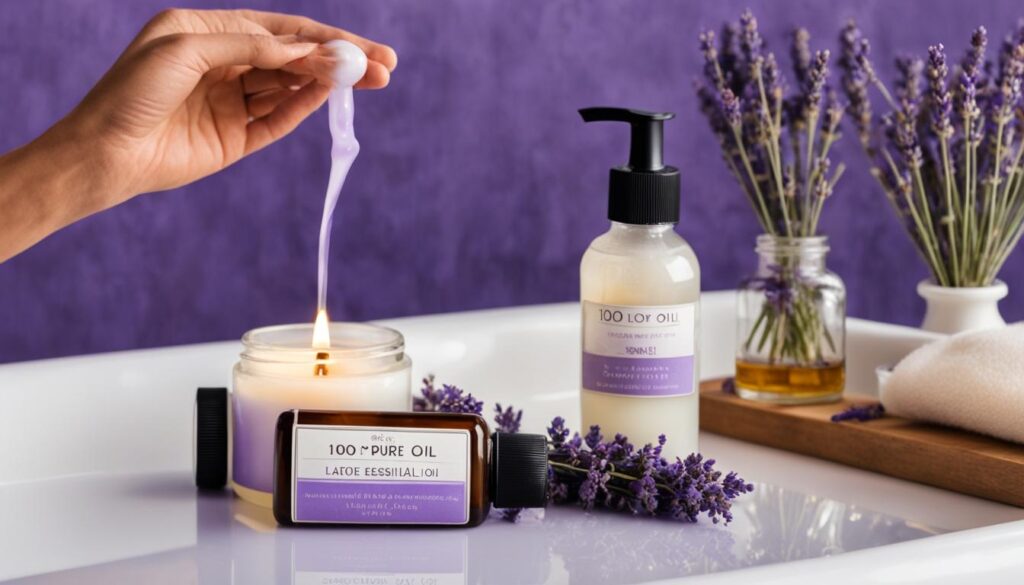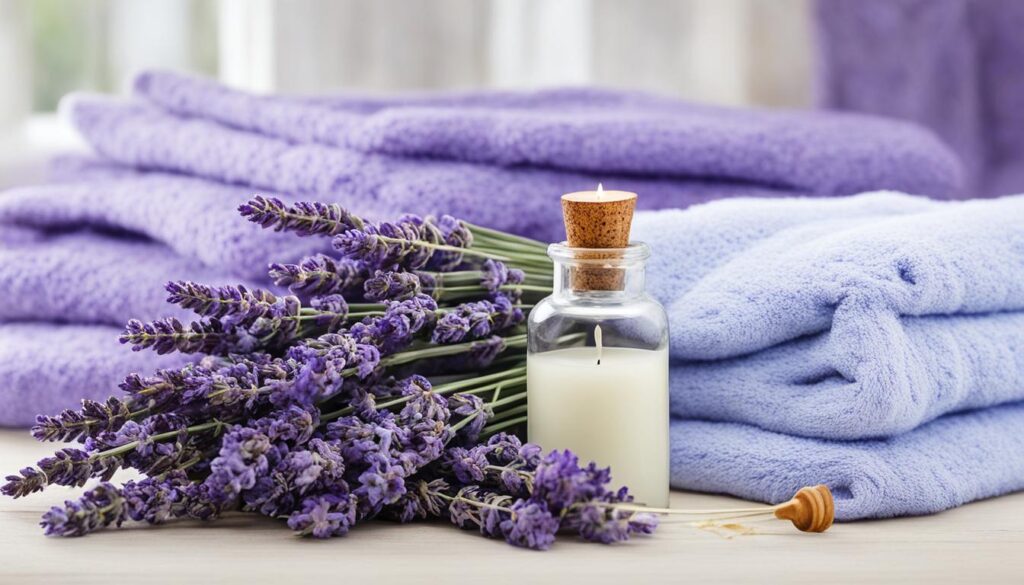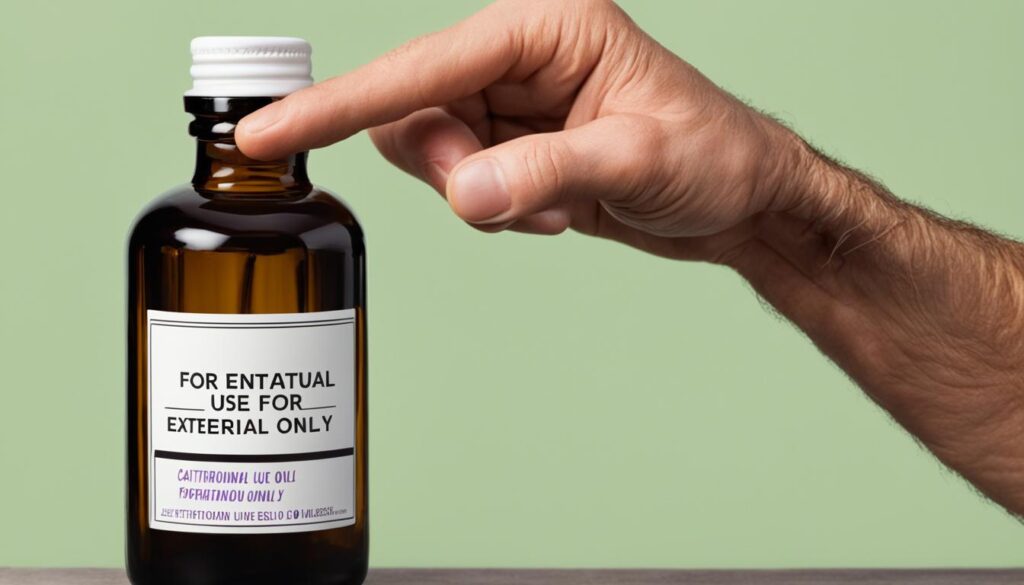Welcome to my article on the incredible benefits of lavender oil. Lavender oil is a versatile essential oil that offers numerous benefits for both the mind and body. It is widely used in aromatherapy for its soothing properties and has been clinically researched for its potential to reduce stress, anxiety, and depression. In addition to its mental health benefits, lavender oil also has a range of skincare and hair care applications, as well as natural headache relief properties. Let’s explore the amazing benefits of lavender oil in more detail.
- Lavender oil is a versatile essential oil used in aromatherapy for its soothing properties.
- It has been clinically researched for its potential benefits in reducing stress, anxiety, and depression.
- Lavender oil offers skincare benefits and can help soothe and heal the skin.
- It also has natural headache relief properties and can promote better sleep.
- When using lavender oil, it’s important to follow safety guidelines and consult with a healthcare professional if needed.
Lavender Oil for Anxiety Relief

Lavender oil has gained attention for its potential anti-anxiety benefits. While the research on lavender oil is still limited, studies have shown promising results in certain populations, including individuals awaiting dental treatment and high-risk postpartum women. Additionally, lavender oil may have a positive effect on anxiety symptoms when used as a dietary supplement. Its calming scent and anxiolytic properties make it a popular choice for anxiety relief.
While lavender oil can be a helpful tool in managing anxiety, it’s important to note that it should not be used as a substitute for professional mental health treatment. It’s always advised to consult with a healthcare professional to develop a comprehensive and personalized approach to anxiety management.
Limited Research on Lavender Oil for Anxiety
Despite the limited research on lavender oil’s effects on anxiety, there have been notable findings. A study conducted on dental patients found that inhaling lavender oil before a dental procedure reduced anxiety levels compared to a control group. Another study focused on high-risk postpartum women and discovered that lavender oil massage significantly reduced anxiety levels in this population.
Furthermore, lavender oil may have an effect on anxiety symptoms when taken orally. A small-scale study found that participants who ingested lavender oil capsules reported a reduction in anxiety symptoms. However, further research is needed to better understand the mechanisms behind these results and the potential long-term effects.
“Lavender oil’s calming scent and anxiolytic properties make it a popular choice for anxiety relief.”
Using Lavender Oil for Anxiety
There are several ways to incorporate lavender oil into an anxiety management routine:
- Aromatherapy: Use a diffuser to fill the air with the calming scent of lavender or apply a few drops to a cloth and inhale deeply.
- Topical Application: Dilute lavender oil with a carrier oil, such as coconut or jojoba oil, and gently apply it to the skin. Popular areas for application include the wrists, temples, and behind the ears.
- Bathing: Add a few drops of lavender oil to a warm bath for a soothing and relaxing experience.
It is essential to note that individual responses to lavender oil may vary, and it may not be effective for everyone. If anxiety symptoms persist or worsen, it is important to seek guidance from a healthcare professional.
Lavender Oil for Sleep Aid

When it comes to getting a good night’s sleep, lavender oil can be a natural and effective solution. Studies have shown that lavender essential oil therapy, combined with sleep hygiene techniques, can improve sleep quality, duration, and onset. This versatile essential oil is known for its sedative properties and soothing scent, making it a popular choice among those seeking sleep aid benefits.
Lavender aromatherapy has been particularly effective in improving sleep in the elderly population. The calming and relaxing effects of lavender oil can help reduce anxiety and promote a sense of tranquility, facilitating a more restful sleep experience.
If you’re struggling with insomnia or restless nights, incorporating lavender essential oil into your bedtime routine may help improve sleep quality and promote a more restorative sleep cycle.
The Science Behind Lavender Oil’s Sleep Benefits
Research has shown that lavender oil can positively impact sleep in several ways:
- Promotes Relaxation: The scent of lavender has a calming effect on the nervous system, helping to reduce stress and promote relaxation before bedtime.
- Induces Sleep: Lavender oil has been found to increase deep sleep, the restorative phase of the sleep cycle. This can lead to improved sleep quality and rejuvenation.
- Reduces Anxiety: Lavender’s soothing properties can help alleviate anxiety, allowing for a more peaceful and uninterrupted sleep.
While lavender oil may not be a cure-all for sleep disorders, it can be a valuable addition to a comprehensive sleep routine.
| Lavender Oil Benefits for Sleep Aid |
|---|
| Promotes relaxation and reduces stress |
| Induces deep sleep for improved sleep quality |
| Alleviates anxiety, allowing for a more peaceful sleep |
It’s important to note that while lavender oil can be an effective sleep aid, it should not be relied upon as the sole solution for sleep disorders or medical conditions. If you have persistent sleep difficulties, it’s advisable to consult with a healthcare professional to determine the underlying cause and appropriate treatment options.
Lavender Oil for Skin Care

Lavender oil is renowned for its numerous benefits in skin care. Its antiseptic, antibacterial, and anti-inflammatory properties make it a versatile and effective ingredient for soothing and healing the skin. Whether you’re dealing with acne, eczema, or psoriasis, lavender oil can provide relief and promote healthier skin.
One of the key advantages of lavender oil is its ability to promote wound healing and reduce scarring. Its natural properties help to regenerate skin cells and support the skin’s natural healing process, minimizing the appearance of scars and improving overall skin texture.
Lavender oil is not only beneficial for the skin but can also be used for hair care. It has been used for centuries to promote healthy hair growth and treat various scalp conditions. The calming and nourishing properties of lavender oil can help soothe an itchy scalp, reduce dandruff, and strengthen hair follicles.
Incorporating lavender oil into your skin and hair care routines is easy. You can add a few drops of lavender oil to your favorite carrier oil, such as jojoba or sweet almond oil, and apply it directly to the skin or scalp. Alternatively, you can look for natural skin and hair care products that contain lavender oil as one of their main ingredients.
With its soothing and healing properties, lavender oil is a popular choice for individuals seeking natural solutions for their skin and hair care needs.
Key Points:
- Lavender oil has antiseptic, antibacterial, and anti-inflammatory properties.
- It can help soothe and heal various skin conditions, such as acne, eczema, and psoriasis.
- Lavender oil promotes wound healing and reduces scarring.
- It is used in hair care products to promote healthy hair growth and treat scalp conditions.
Lavender Oil for Headache Relief

Lavender oil is a natural remedy that has been used for centuries to provide headache relief. Studies have shown that inhaling the soothing scent of lavender oil can help alleviate headache symptoms and improve overall well-being. Its analgesic properties make it an effective remedy for headaches.
There are several ways to use lavender oil for headache relief:
- Topical application: Apply a few drops of lavender oil diluted with a carrier oil, such as coconut or almond oil, to the temples or forehead. Gently massage the oil into the skin using circular motions.
- Inhalation: Place a few drops of lavender oil on a cloth or tissue and inhale deeply. Alternatively, use a diffuser to fill the room with the calming scent of lavender oil.
Note: Individual results may vary, and it’s important to consult with a healthcare professional for severe or chronic headaches.
“Inhaling the scent of lavender oil can help alleviate headache symptoms and improve overall well-being.”
Lavender oil’s analgesic and soothing properties make it a safe and natural alternative to over-the-counter pain medications. Its relaxing aroma has been known to provide relief from tension headaches, migraines, and stress-related headaches.
Lavender oil can be a beneficial complement to other headache management techniques, such as rest, hydration, and stress reduction. However, it’s important to note that lavender oil should not replace medical advice or treatment for severe or chronic headaches. If you experience persistent or severe headaches, it’s essential to consult with a healthcare professional for a proper diagnosis and treatment plan.
How to Use Lavender Oil Safely

When it comes to using lavender oil, it’s essential to prioritize safety. By following a few guidelines, you can maximize the benefits of lavender oil while minimizing any potential risks. Here are some tips on how to use lavender oil safely:
Dilute Lavender Oil with a Carrier Oil
Before applying lavender oil to your skin, it’s crucial to dilute it with a carrier oil. This helps prevent skin irritation or allergic reactions. Popular carrier oils include jojoba oil and sweet almond oil. To dilute lavender oil, use a ratio of 2-3 drops of lavender oil per teaspoon of carrier oil.
Application Methods
There are several ways to use lavender oil. You can gently massage the diluted oil into your skin, add a few drops to your bathwater for a soothing soak, or inhale it using a diffuser or by placing a few drops on a cloth. Experiment with different application methods to find what works best for you.
Purchase Pure Lavender Essential Oil
When buying lavender oil, make sure to choose a pure, high-quality product from reputable sources. Essential oils are not regulated by the FDA, so it’s essential to do your research and buy from trusted brands. Look for pure lavender essential oil and check for third-party testing to ensure its authenticity and quality.
Proper Storage
After purchasing lavender oil, store it in a dark amber or cobalt bottle to protect it from direct sunlight. This helps preserve the oil’s potency and effectiveness. Keep the bottle tightly closed when not in use and store it in a cool, dry place.
Other Potential Benefits of Lavender Oil

In addition to its well-known benefits, lavender oil has been studied for its potential effects on allergies, hair growth, and menopause symptoms.
Some research suggests that lavender oil may act as a natural antihistamine and provide relief for allergy symptoms. Its anti-inflammatory and soothing properties could help alleviate allergic reactions and reduce discomfort.
Lavender oil has also shown limited evidence of promoting hair growth and improving symptoms of baldness. Its nourishing properties may stimulate hair follicles and enhance hair growth, making it a potential natural solution for those experiencing hair loss or thinning.
Furthermore, lavender oil has been found to help reduce flushing and other menopausal symptoms in women. Its hormone-balancing effects may help alleviate hot flashes, mood swings, and sleep disturbances associated with menopause.
Although these potential benefits are promising, further research is needed to fully understand the mechanisms behind lavender oil’s effects and its optimal use in these areas.
| Benefit | Description |
|---|---|
| Lavender Oil for Allergies | Potential relief for allergy symptoms and soothing properties |
| Lavender Oil for Hair Growth | Possible promotion of hair growth and improvement of baldness symptoms |
| Lavender Oil for Menopause | Reduction in flushing and other menopausal symptoms in women |
Remember, while lavender oil shows promise in these areas, it shouldn’t replace professional medical advice or treatment. Always consult with a healthcare professional before using lavender oil for specific conditions or concerns.
Precautions and Considerations

While lavender oil is generally considered safe for most people, there are some precautions and considerations to keep in mind. Lavender oil may cause skin irritation or allergic reactions in some individuals. It should not be ingested unless under the supervision of a medical professional, as it can have toxic effects. It’s also important to note that essential oils are not regulated by the FDA and may vary in quality. When purchasing lavender oil, look for a reputable supplier that uses gas chromatography and mass spectrometry (GC/MS) to analyze the product’s quality.
| Precautions | Considerations |
|---|---|
|
Avoid skin irritation:
|
Professional guidance:
|
|
Avoid ingestion:
|
Quality assurance:
|
Note: Always consult with a healthcare professional before using essential oils, including lavender oil, especially if you have any underlying health conditions or are taking medication. This section provides general precautions and considerations but is not an exhaustive list. Individual reactions may vary, so it’s important to listen to your body and seek medical advice if needed.
Conclusion
In conclusion, lavender oil provides a wide range of benefits for both the mind and body. Its soothing properties make it an ideal natural remedy for promoting relaxation, reducing anxiety, and relieving stress. When used in aromatherapy or applied topically, lavender oil can also improve sleep quality and aid in soothing the skin. Additionally, lavender oil has been found to provide natural headache relief and may offer other health and wellness benefits.
However, it is important to use lavender oil safely and responsibly. Always dilute it with a carrier oil before applying it to the skin to prevent any possible irritation or allergic reactions. It should not be ingested without the guidance of a healthcare professional, as it can have toxic effects. Additionally, while lavender oil can complement mental health and self-care practices, it should not be used as a substitute for professional mental health treatment or medical advice.
In conclusion, incorporating lavender oil into your wellness routine can provide numerous benefits. Remember to use it mindfully and consult with a healthcare professional if needed. Lavender oil can be a powerful ally in promoting relaxation, reducing anxiety, improving sleep, soothing the skin, and offering natural headache relief. Explore the possibilities and enjoy the benefits that lavender oil has to offer.
FAQ
What are the benefits of lavender oil?
Lavender oil has a range of benefits for the mind and body. It promotes relaxation, reduces anxiety and stress, improves sleep quality, soothes the skin, provides natural headache relief, and potentially offers other health and wellness benefits.
Can lavender oil help with anxiety?
Yes, lavender oil has been studied for its anti-anxiety benefits. While research is limited, studies have shown that lavender oil may help reduce anxiety in specific populations, such as people awaiting dental treatment and high-risk postpartum women.
Can lavender oil help with sleep?
Yes, lavender oil can promote sleep and fight insomnia. Studies have shown that a combination of sleep hygiene techniques and lavender essential oil therapy can improve sleep quality, duration, and onset. Lavender aromatherapy has been particularly effective in improving sleep in the elderly population.
What are the benefits of lavender oil for skin care?
Lavender oil has antiseptic, antibacterial, and anti-inflammatory properties that can help soothe and heal the skin. It can be used to treat various skin conditions such as acne, eczema, and psoriasis. Lavender oil can also promote wound healing and reduce scarring. Additionally, it is used in hair care products to promote healthy hair growth and treat scalp conditions.
Is lavender oil effective for headache relief?
Yes, lavender oil has been used for natural headache relief. Studies have shown that inhaling the scent of lavender oil can help alleviate headache symptoms and improve overall well-being. Its analgesic and soothing properties make it an effective remedy for headaches.
How should lavender oil be used safely?
When using lavender oil, it’s important to dilute it with a carrier oil before applying it to the skin. Lavender oil can be massaged into the skin, added to bathwater, or inhaled using a diffuser or cloth. It’s also important to purchase pure lavender essential oil from reputable sources and store it in a dark amber or cobalt bottle, away from direct sunlight.
Are there any other potential benefits of lavender oil?
Lavender oil has been studied for its potential effects on allergies, hair growth, and menopause symptoms. Some research suggests that lavender oil may act as a natural antihistamine and provide relief for allergy symptoms. There is also limited evidence suggesting that lavender oil may promote hair growth and improve symptoms of baldness. Furthermore, lavender oil has been found to help reduce flushing and other menopausal symptoms in women.
What precautions and considerations should be kept in mind when using lavender oil?
While lavender oil is generally considered safe for most people, it may cause skin irritation or allergic reactions in some individuals. It should not be ingested unless under the supervision of a medical professional. It’s important to note that essential oils are not regulated by the FDA, so it’s important to choose a reputable supplier that analyzes the product’s quality. Consulting with a healthcare professional is recommended for severe or chronic headaches.






